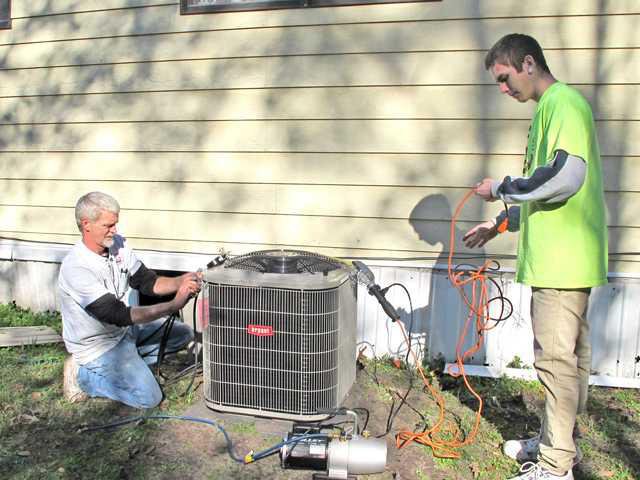Past winters have been especially cold for Riceboro resident Nancy James.
James, a senior citizen who said her electricity bills average $300 in cold months, once bundled up with blankets and ran her stove to chase the seasonal chill out of her home.
Now, thanks to the generosity of two area businesses, James has a new heating and air-conditioning unit and can look forward to spending her nights in warmth — with significantly less fire risk and lower bills.
“I appreciate what you all did,” James said, wiping tears from her eyes as she thanked Coastal Georgia Mechanical owner Geoff Collins and Mingledorff’s sales representative Joe Mingledorff.
After being sent to investigate efficiency issues at James’ home, Coastal Georgia Mechanical service technician Kevin Bentley coordinated with Mingledorff’s HVAC system distributor to donate a unit for her home.
But James is only one of countless Coastal Georgia residents whose heating costs are unbearable, and one program that has offered assistance to hundreds of thousands of families over more than 20 years is on an indefinite delay.
The Low Income Home Energy Assistance Program, coordinated locally through the Coastal Georgia Area Community Action Authority, was slated to begin Dec. 1, but congressional budget inaction has left the program in limbo.
Funds for the program are allocated at a federal level and then disbursed from the state.
“At this time, Congress has not approved a budget; therefore, we honestly don’t know when that is going to happen — we can only operate the program if we are assured that we will receive the funds and, as of now, there is no assurance,” said Tres Hamilton, director of the CGACAA.
Hamilton said it seems as though Congress has lost sight of the program and its purpose.
“This is not one of the programs that they champion,” she said of local Congressional representatives. “If they championed this the way they champion making sure the top 10 percent doesn’t have their income reduced, then we’d have a real good program.”
The program has served as many as 900 families in Liberty County in past years, but funding over the past year has been cut tremendously, Hamilton said. This year, each household that qualifies according to poverty income guidelines would receive $350 if the program receives funds.
“The failure of Congress to act has placed additional burdens on families that are already in critical situations,” the CGACAA director said. “Not one single member of Congress is without a job, food, heat or a place to lay their heads at night. Unfortunately, the families that we serve are.”
For their part, Coastal Georgia Mechanical owner Geoff Collins and service technician Kevin Bentley said they frequently encounter cases where residents cannot afford to heat their homes and often cannot afford to make modifications that would reduce their bills.
“She’s paying almost $300 a month for just her light bill, and she’s on a fixed income,” Bentley said of James. “I don’t know how she’s making it; I really don’t.”
Before her new system was installed Thursday, James’ unit was more than 20 years old, and it was incorrectly wired with the thermostat hanging off the wall, the service technician said. Older equipment and gas furnaces, which should be monitored by carbon dioxide sensors, often lead to higher heating costs, perform less efficiently and can lead to carbon monoxide poisoning or fires.
“You never know on some of those old units … it could crack, and they’re just playing Russian roulette with their lives,” Bentley said.
One alternative to the home energy assistance program is the HomePlus Energy Efficient Home Improvement Loan offered by both Coastal Electric and Canoochee Electric cooperatives. The zero-interest loan is open to members of the co-ops for improvements to homes in the state.
Interest for the loans is provided by a grant made possible by the federal stimulus package, according to Coastal EMC spokesman Mark Bolton.
Customers also can apply for a free voucher for a home checkup, where the co-op pays a contractor to conduct an efficiency inspection and tuneup. Applications for the checkup must be turned in by Dec. 31, Bolton added.
Georgia Power partners with the Salvation Army to fund Project Share, a natural gas assistance program for low-income natural gas customers served by the Atlanta Gas Light Company pipeline system.
Project Share is funded through opt-in donations from Georgia Power customers but is administered by the Salvation Army.
Lack of energy assistance funds leaves some residents in the cold


Sign up for our e-newsletters